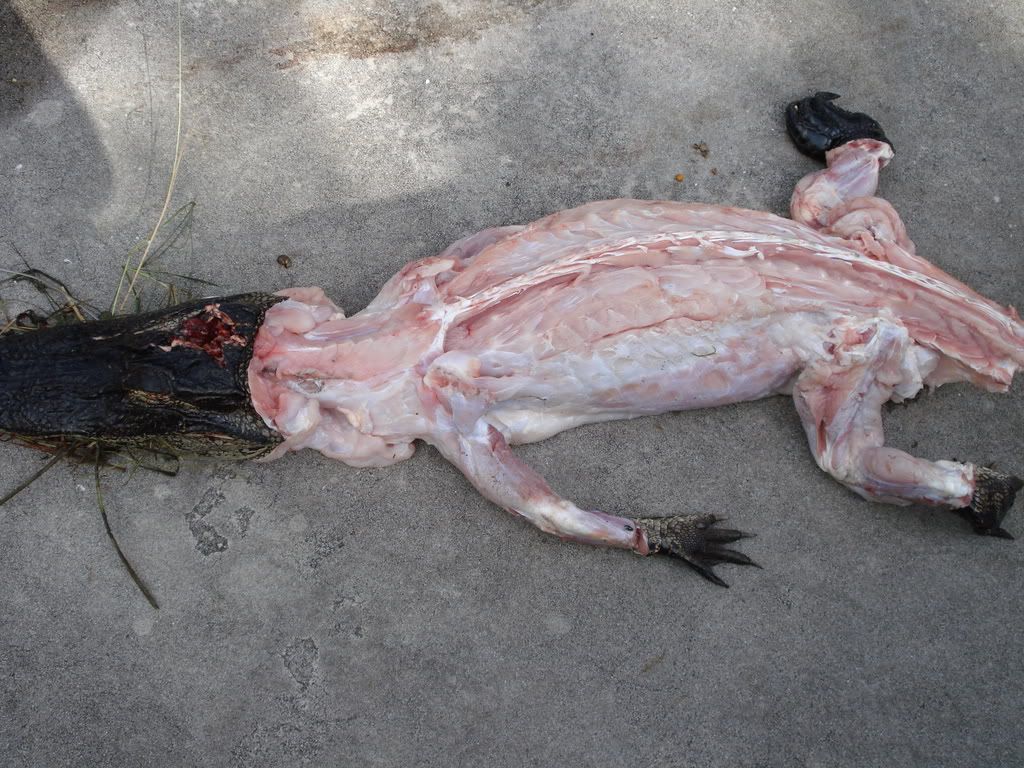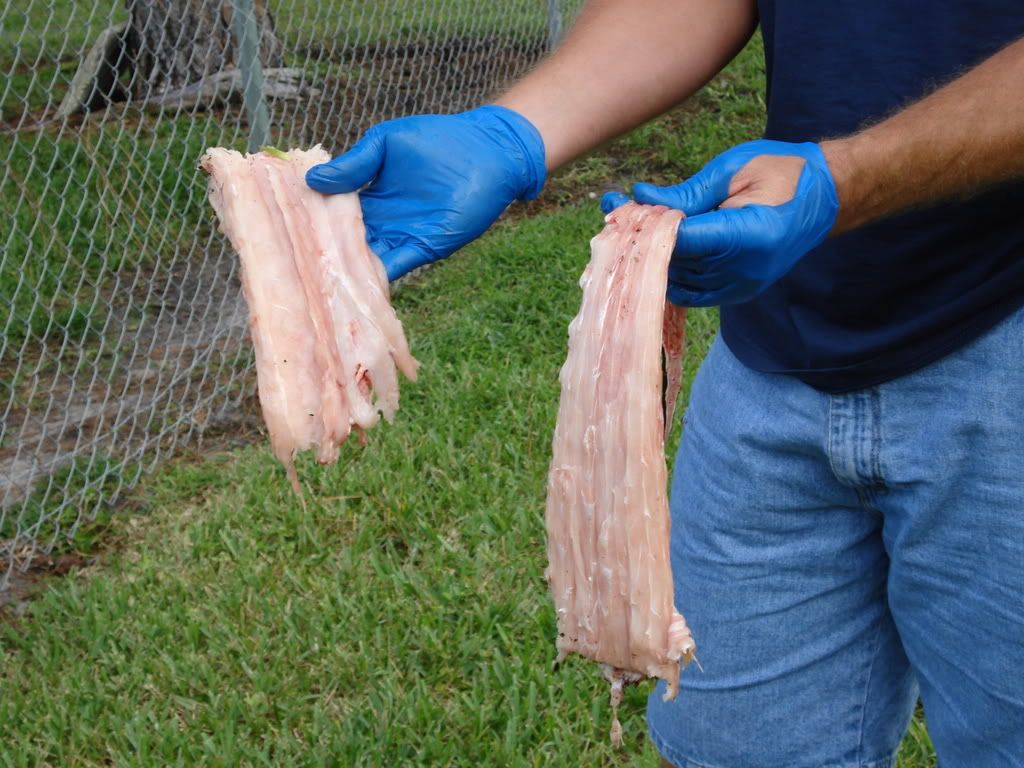I got some good feedback on feeding the gator meat from experts at the University of Florida as well as Florida Game and Fish.
Most of my fears have been laid to rest, but I also feel validated in my decision not to feed most of the organs such as the brain, liver and kidneys.
Here is what I asked them:
In an effort to provide the best nutrition possible for my working dogs I feed them a diet of raw meat and bones, primarily chicken from Wal-Mart.
I have just started receiving meat and bones from an alligator processor in Indian River County , FL and I am starting to feed the wild harvested alligator parts to the dogs. Mostly sections of the tail and the legs.
Should I have concerns due to mercury that the gator meat and bones may contain? In regard to the dogs, is there a parasitic risk from trichinella, trematodes (flukes), ascarids (roundworms) and pentastomes due to the raw meat?
Thank you for any insights you may be able to offer.
Eric Eschmann
firemediceric@yahoo.com
Here's their responses to my e-mails:
Dear Eric
I am dog man myself (Catahoula leopards and German shorthairs).
I think there may be concerns with both mercury and parasites- but they are mild and probably easily offset.
Mercury- alligators do accumulate mercury and as top predators, can have quite elevated levels in the meat and other tissue. It depends on which lakes they come from and how large/old they are. In the very worst cases (large, old alligators from lakes known to have high mercury levels in fish and sediments) the levels in alligator exceeded acceptable human diet standards of 1.0- 1.5 parts per million wet weight (ppm) (perhaps that says more about the standards than about mercury?- but there we are).
Published reports indicate alligator muscle levels of 0.04- 0.61 ppm (Delaney, et al 1988) ; 0.06-0.8 ppm (Burger et al. 2000,) and 0.1- 2.7 ppm. Heaton-Jones et al 1997. Liver had substantially higher levels (up to 40 ppm) and alligators from the everglades region had much higher levels than central and north Florida . Meat from farmed alligators had very low levels.
The state of Florida has information on mercury levels in fish from Florida lakes and I would use this as an indication of where to expect higher alligator mercury levels.
Therefore, If you avoid meat from very large alligators, reject meat from south Florida (say south of state rd 70), don’t feed offal (liver, guts etc.) there should be minimal problems and this would be equally true for your dogs and your family. As always, for both dogs and family, risks from exposure are greater for pregnant, lactating and growing young dogs and kids. But the human recommendation for fish (bass) from high mercury lakes is ‘no more than once a week’ so feeding alligator to dogs a couple or three times a week should be OK given the dogs higher metabolism.
Alligators also have parasites (as do all wild animals and most domestic animals!) and some of these may be present in some life forms in the muscle tissue. The bulk of all parasites are species specific and require quite complex interactions of different life stages thru different hosts. In the case of alligators, most of the recorded parasites spend part of their life cycle in fish or are alligator specific. I would have to check if any alligator parasites cross host to dogs, but given the large evolutionary distance between them and very different physiology (warm blooded v cold blooded) I wouldn’t expect many. Most parasites that do have an infective stage in vertebrate muscle are easily destroyed by moderate heat or hard freezing- if your preference is to feed raw meat, then at least freeze it hard and thaw if the parasites are a worry.
The only cross infections I am aware from alligators to mammalian hosts (mostly to people) are:
Leptospirosis in alligator egg collectors (almost certainly from rodents peeing on alligator nest materials).
West Nile virus (speculated but never proven or demonstrated).
Intestinal infection with Giradia, E. coli, salmonella and a few other common bacteria due to inadequate hygiene during butchering.
James Perran Ross
Department of Wildlife Ecology and Conservation
Newins-Ziegler Hall, Box 110430
University of Florida , Gainesville FL 32611 USA
Phone 352 392 7137
And another:
Hi Eric -
Alligators are relatively long lived, and do accumulate mercury in their muscle tissue. In general, the larger the animal the more mercury. The degree of contamination really depends on where they are from – there are huge differences even within some sites like the Everglades . If you have a source of meat that comes from farms, and you know that those farmed animals are being fed something with low mercury (eg, farmed catfish parts, chicken, almost anything that humans also eat) you could probably be pretty confident. If from farms, the meat is usually also from younger animals, who have not had much of a chance to accumulate mercury. If you can satisfy yourself that the animals are farmed and are fed on something without much mercury you can be reasonably sure the meat is safe.
However, my impression of alligator farms is that they switch back and forth to whatever food is cheap, so you would probably want to confer with the actual farm owner. In addition, you are getting the meat from an alligator processor – this might well include wild alligators. If so, you might be getting some high mercury values. You also mentioned feeding alligator parts – in general mercury will be higher in liver, kidney and brain, so avoid those tissues no matter what the source. There are other reasons to avoid these parts too – pesticides and pcb’s also accumulate there.
There could definitely be effects on your dogs if they are consuming a lot of the meat over time (we mammals do not have good ways of excreting methylated mercury), even if the mercury concentrations in the meat were moderate (0.1 – 0.3 ppm wet weight). The most obvious effects on mammals are on embryos and young – the most severe is birth defects and embryonic death, but even very low doses can result in poor learning ability and effects on IQ in young. The type of mercury that will be in the gator meat is also almost all in the most toxic form – methylmercury. So if you have any misgivings about the mercury content of the gator meat its particularly important to keep the bitches off of the meat at any point in their pregnancy and while lactating (same goes for humans!). Same is true for young dogs.
You could get the meat tested – but that is somewhat expensive and you would probably have to keep testing unless you were sure the quality of meat did not change.
I have forwarded this to Dr. Marilyn Spalding who can comment on the possibility of parasitic infections.
Peter Frederick
Here's the response from Florida Wildlife Commission;
Mr. Eschmann,
Mercury should not be a concern for your dogs unless you regularly feed them alligator meat from alligators taken from areas that have high levels of mercury contamination, such as the Everglades.
You should consult with a veterinarian regarding potential parasites and infectious agents such as salmonella. Keep in mind that there is a significant number of microorganisms that live on the hide of alligators, and that alligators should be washed with a disinfectant prior to skinning and the removal of meat to prevent contamination of the meat.
Alligator Management Program
Florida Fish & Wildlife Conservation Commission
620 S. Meridian Street
Tallahassee, FL 32399-1600
Visit MyFWC.com/gators
Always looking for training avenues close to home. Any suggestions? Previous Topic
Previous Topic Index
Index Next Topic
Next Topic












 Top
Top








.jpg)
